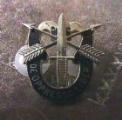Well much of this discussion is apples and oranges.
First, I spent nearly 8 years as a regular army officer, serving in a mech infantry unit in the waning days of our Cold War presence in West Germany, followed by my team time in 5th SFG, which included all of Desert Shield and Desert Storm.
With that experience under my belt I felt I had accomplished my military goals, having become a Green Beret and and commanded men in a combat zone, so I honored a commitment to my family and left the active force to pursue a civilian career. I went to law school and joined a Guard unit. The unit in my state was what we called an "Enhanced Infantry Brigade," one of 15 separate combat brigades established by the Army to receive extra training and serve as the initial units to be mobilized in time of war. For some three years I didn't get it. Things were so different in the Guard that it made no sense to me as a Regular. But I did not just observe it or attempt to train it. I owned it. I commanded, I took major staff positions, as a BN and BDE S-3, for example, and did my best to make these units as good as they could be. But here something I learned most regular officers don't have a clue about: AC Army is a training readiness organization. National Guard is a personnel readiness unit. The measure of success, and therefore the focus, of each organization is completely different. Why do some AC commanders conduct outrageous training events? Because their commander loves it and it gets them promoted. Why do some Guard commanders do outrageous recruiting or retention events (like a fraternity rush week)? For the same reason. As a Guard Commander you are judged by how many billets you fill, not by how your unit performs. A little fat? no worries. If you fire that overweight E-7 it is on you commander to go find a civilian, convince them to join, and then grow them up to be an E-7 someday. No AC officer has to worry about that.
So, I never claim RC units are as proficient as AC units; only that they don't have to be while in a pre-mob status. One reason they take so long to get up to mobilized status is that AC leaders don't know F-all about training Guard units and tend to just think of them as F'd up regular units. Our training doctrine is all written for AC units with the term "RC" sprinkled in here and there. METL is one's warfighting tasks. So like units in the AC and RC should have the exact same METL, yet too often we provide a dumbed down METL for the RC unit to train to. Wrong approach. What RC units need is the same METL, but they need to focus their pre-mob training on a solid foundation of fundamental skills. Best task I found in the ARTEP manual was "maintain opsec." Try to sell that to a general. I tried, and he thought I was on crack. He wanted to do movement to contact, attack and defend; just like the AC units. So we end up building a half-ass ability to do high echelon tasks with no foundation of core skills underneath it. Then, once mobilized, units need to start from scratch and go back to square one and build a foundation. Better if our RC units did nothing but focus on simple foundational skills for collective training at BDE and BN level until mobilized.
But go try to find guys who have commanded both regular army and national guard units. There aren't many. Guard generals don't understand the AC and vice versa.
But my concerns now, as a strategist, are way bigger than these training issues I wrestled with as a Major. Our national security is much more than just our military. It is our economy, our influence, our education, etc. If we focus on just one line of operation and build far too much military when it is truly not needed at the expense of every other line of operation we will fail as a nation. Bill is right about the small picture, but he is wrong about the big picture.
Wars are fought by 18 year old kids. Wars are fought by units that did not exist the year prior. Wars are fought by citizen soldiers. These little adventure of choice of the past 20 years? Those aren't wars. Combat? sure. Not wars. There is a big difference. Can America be attacked? Of course. But no one can bring war to America without giving us years of advance warning. (exchanging nukes is another matter, and no amount of army will help there).
Likewise we are better off when we cannot so easily bring war to others. Having a warfighting army on the shelf disrupts our system of governance and enables presidents to do what was never intended to be within their power to do. That is a fact. Will that mean that we would not longer be able to attempt to control everything in the world and bend it to our will? Yes, and that is not a bad thing.







Bookmarks